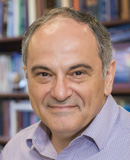
Distinguished Mentor Award
Dr. Diomedes Logothetis came to VCU School of Medicine in 2008 to serve as Professor and John D. Bower Chair of the Department of Physiology and Biophysics. Since then, in addition to his activities leading the department, he has mentored 18 predoctoral students, 27 postdoctoral students, and student advisory committees. He makes time to mentor summer undergraduate student interns. He has developed a program wherein graduate students prepare for upcoming seminar guest speakers by formally reviewing the speaker’s work, so that they build their knowledge and gain the most from these opportunities. He has developed programs to support talented scientists who did not speak English as their first language, including a week-long writing class and a one-on-one mentoring program. These are just a few examples of why Dr. Logothetis is being recognized with the 2014 Distinguished Mentor Award.
“What sets Diomedes apart are the countless hours he spends mentoring which do not “count” towards any formal role he serves,” states program graduate Rahul Mahajan, M.D., Ph.D. “Diomedes’ mentorship was integral in my obtaining an F30 in 2009 on my first submission.”
After Dr. Logothetis moved to Richmond, Miguel Fribourg, Ph.D., Postdoctoral Fellow, Department of Neurology, Icahn School of Medicine, Mount Sinai University, travelled back and forth from New York to Richmond to continue his work with Dr. Logothetis. “Most people I consulted with indicated the challenges of long-distance mentoring and strongly recommended that I switch labs. Staying in Dr. Logothetis’ lab is undoubtedly the best professional decision I have ever made. His commitment to my training has gone far beyond any of my expectations, an endeavor that has crystallized in a first author publication in Cell and a patent submission.”
Dr. Logothetis is renowned for preparing students for the practical professional skills they will need to succeed, including writing and presentation skills. “Dr. Logothetis places very high standards on his students. His meticulousness is exemplified when I give presentations to an audience, no matter how informal…it is not uncommon to see Dr. Logothetis at my next personal meeting, waiting with pages full of notes he has taken during my presentation. He is always looking for ways to improve as a scientist and takes it upon himself as a mentor to see that I steadfastly improve in my endeavors,” describes Junghoon Ha, M.D.-Ph.D. Candidate, VCU SOM.
“Diomedes actively encourages teamwork and collaboration, traits that are indispensible in the current era of multidisciplinary research,” states Vasileios I. Petrou, Ph.D., Postdoctoral Research Student, Department of Physiology and Cellular Biophysics, Columbia University. Tooraj Mirshahi, Ph.D., Geisinger Health system, agrees. In his lab, “he fostered an environment that while demanding excellent science, remained a joy to work in and encouraged working together that benefitted all.”
“Our lab meetings are filled with lively discussions about current research. Recently, he has introduced think tank sessions where the lab can brainstorm collectively on new frontiers of research. Recently, I was awarded an F31 from the NINDS and this was a direct result of his mentoring,” explains Candice Hatcher-Solis, Ph.D. Student, VCU SOM.
Dr. Logothetis’ mentor, David Clapham, M.D., Ph.D., Aldo R. Castaneda Professor of Cardiovascular Research, Howard Hughes Medical Institute Investigator, Harvard Medical School Professor of Neurobiology and Pediatrics, Children’s Hospital Director of Basic Cardiovascular Research, recalls, “Diomedes approached me for a position in the laboratory to learn the techniques for patch clamp electrophysiology…he was the most persistent and dedicated student I have had.” Dr. Logothetis is passing on his passion and high standards to the next generation of scientists. Dr. Mahajan summarizes this very well. “I have often had the thought that although I benefitted greatly from my fortuitous decision to join Diomedes’ lab, the biggest beneficiaries of that decision will be my future graduate students who will hopefully prosper with my support as I attempt to emulate Diomedes.”